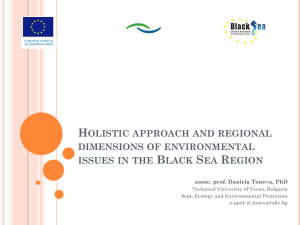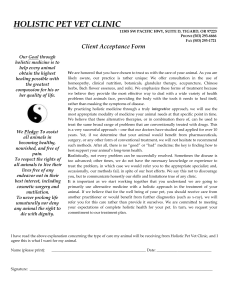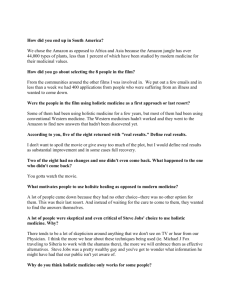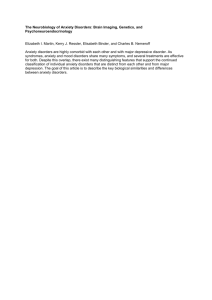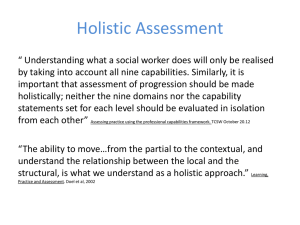'Holism' in health and caring.
advertisement
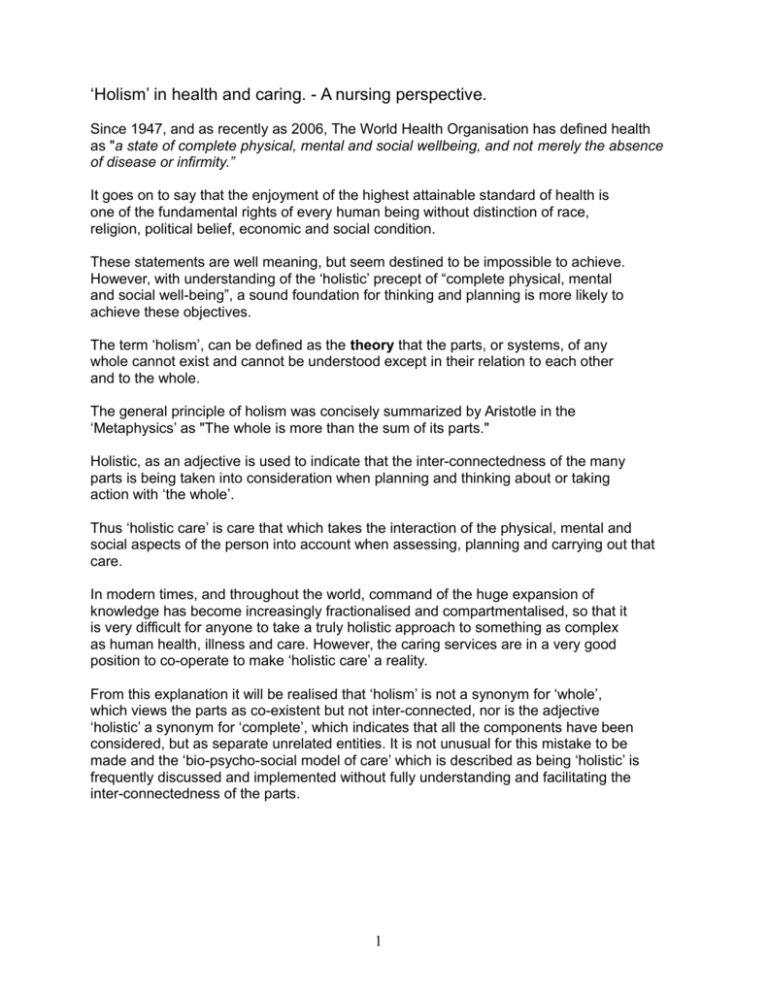
‘Holism’ in health and caring. - A nursing perspective. Since 1947, and as recently as 2006, The World Health Organisation has defined health as "a state of complete physical, mental and social wellbeing, and not merely the absence of disease or infirmity.” It goes on to say that the enjoyment of the highest attainable standard of health is one of the fundamental rights of every human being without distinction of race, religion, political belief, economic and social condition. These statements are well meaning, but seem destined to be impossible to achieve. However, with understanding of the ‘holistic’ precept of “complete physical, mental and social well-being”, a sound foundation for thinking and planning is more likely to achieve these objectives. The term ‘holism’, can be defined as the theory that the parts, or systems, of any whole cannot exist and cannot be understood except in their relation to each other and to the whole. The general principle of holism was concisely summarized by Aristotle in the ‘Metaphysics’ as "The whole is more than the sum of its parts." Holistic, as an adjective is used to indicate that the inter-connectedness of the many parts is being taken into consideration when planning and thinking about or taking action with ‘the whole’. Thus ‘holistic care’ is care that which takes the interaction of the physical, mental and social aspects of the person into account when assessing, planning and carrying out that care. In modern times, and throughout the world, command of the huge expansion of knowledge has become increasingly fractionalised and compartmentalised, so that it is very difficult for anyone to take a truly holistic approach to something as complex as human health, illness and care. However, the caring services are in a very good position to co-operate to make ‘holistic care’ a reality. From this explanation it will be realised that ‘holism’ is not a synonym for ‘whole’, which views the parts as co-existent but not inter-connected, nor is the adjective ‘holistic’ a synonym for ‘complete’, which indicates that all the components have been considered, but as separate unrelated entities. It is not unusual for this mistake to be made and the ‘bio-psycho-social model of care’ which is described as being ‘holistic’ is frequently discussed and implemented without fully understanding and facilitating the inter-connectedness of the parts. 1 An Holistic Concept of Health and Welfare It has become custom to illustrate the aspects of the health concept with a triangle that denotes Body, Mind and Spirit or,as below, using adjectives, but there Is a problem with this concept because 'spirit' and ‘social’ are very intangible aspects of being human, and at best are only a part of the much wider dimension of the person that also encompasses the body and the mind. . Figure1 Aspects contributing to the 'whole person'. More recently the concept of the 'bio-psycho-social model' of health has been adopted. The component parts are defined as adjectives rather than as the nouns, and these are illustrated by way of interlocking circles where the inter-connected biological, psychological and sociological aspects contribute equally to health. Neither of these concepts is complete in incorporating all the aspects of our being that make us uniquely human, or contribute equally to our health. What is missing are all our cultural and emotional faculties which are the component parts of sociability, which are made up of language and story telling; art and creativity; music and dance; humour, play and spirituality. There is not a generic name for cultural faculties, and the term ‘culture’ and ‘cultural’ usually refers to the activity of engaging in music, art and such like. The term ‘society’ and ‘social’ refers to people interacting with each other. Neither of these conveys the importance of these factors to a full understanding of health but 'culture' includes more depth. Being based on the neurology of the physical brain and its functions, which include the thinking, feeling and memorising of the mind, they are the key factor in the interconnectedness and interdependence of all the parts that make us human. When the terms ‘social’ or 'cultural' are used in relation to health and relationships, these understandings must be borne in mind. 2 One of the factors of our cultural inheritance is ‘spirituality’ and it is very difficult to define. It is an experience that is variously described as a feeling of being at one with the universe and other people, or as feeling a sense of awe, mystery and fulfillment, which possibly arises when all the physical and social needs are being met. It is a controversial idea but Religions, which are man made organisations that define ‘faith’ and preach ‘morality’ can lose touch with this universal spiritual dimension of being human. Figure 2 Aspects constituting an holistic view of health (The circle at the centre of the diagram could stand for 'health' but could also stand for the uniquely human experience of a conscious awareness of 'contentment', which can accommodate some disease and disability.) Whilst bearing in mind the inter-connectedness of all parts of the person, the physical, mental and cultural aspects of health will be considered in more detail separately. Health of the body is shown with physical fitness, and it is maintained with a diet that contains the correct balance of protein, fats and carbohydrate, and the necessary minerals and vitamins. In addition to this, adequate fluids are needed and activity and exercise must be balanced with rest and sleep. Health of the mind is shown with emotional and psychological well-being. Thinking and feeling are functions of the physical brain and thus dependent on a healthy ‘body’, but a distinction is made between disorders of the brain and disorders of behaviour. It is, however, very difficult to define the distinction between healthy, or sound behaviour and unhealthy, or unsound, behaviour‘. A dictionary definition of mental health is "A state of emotional and psychological well-being in which an individual is able to use his or her thinking and emotional 3 capabilities, function in society, and meet the ordinary demands of everyday life." This is shown by having a sense of purpose, by having a network of friends and relations and social activities, and by experiencing contentment. Cultural/Social health is difficult to distinguish from mental health but is shown by involvement in a variety of activities with others, at work and at play. All the cultural abilities are there for sharing, and with laughter and sorrow, enhance life and provide the pleasures and rewards of companionship. Holism and Care. Ill health can be due to many primary factors in each of the physical, mental and social aspects, but they all have something in common, in that their symptoms generate anxiety, which also has an adverse effect on each of the other aspects. Thus, physical disorders may be due to such as injury, infections, neoplasms and degeneration, and these can result in the loss of function and cause pain and many other symptoms which will include varying levels of anxiety. This will interfere with normal physiology, leading to additional symptoms and interfering with healing processes. Anxiety will also influence, and maybe increase difficulties with the social aspects of life, which can also delay recovery. Mental disorders include schizophrenia, the major depressive illnesses and the dementias. They all have a profound effect on the sufferers’ social well-being, which is made worse by stigma and prejudice. They, of themselves, also generate high levels of anxiety and fear which can lead physical harm to self and others, if it is not allayed adequately. Social disorders are usually classified as mental disorders, but are those that result from social unpopularity, exclusion or derision and lead to behaviour strategies that are attempts to allay the extra anxiety this causes. They include social (neurotic) depression, phobic, obsessional and anxiety states, personality disorders and anorexia. All of these can have serious effects on the physical state of the body. Conclusion. It is the arousal of anxiety which is the core to understanding the nature of an holistic approach to caring for people. Whatever causes of the neuro-chemical response, the protective reactions which occur throughout the body also affect mental and social behaviour. From this, it follows that attention should always be paid to reducing anxiety as a priority, alongside all the other skills that promote healing. Postscript. Nursing is only one of the contributors to the care and management of 'ill' people, and for nurses to provide holistic care, they have to be an incorporated part of an holistic organisation, from the local, to the national. 4 Professions arose to serve the public in various ways, and at their best they should exemplify holistic organisations, with all parts of the structure, function and personnel closely integrated. Unfortunately this does not fully apply to Nursing. For example, in the past, mental nurses were not recognised by the RCN, and men were not accepted for general nursing, and that left its traces, and now there is some structural and fiscal division between nurses in education and those in clinical practice. At present there is erosion of professional autonomy because of being nationalised, and political interference is not taking account of the holistic nature of all the professional bodies that are the constituent parts of the N.H.S. The results of this can be seen the incidents of poor standards of nursing care and low morale that are being evidenced in some areas and are demanding attention. 5
